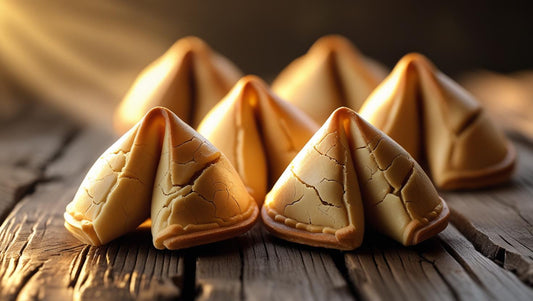Fortune cookies—those crisp, golden treats with a surprise message tucked inside—are more than just a fun end to your meal. But have you ever wondered where they really come from, or if they’re actually Chinese? And what about that fortune—should you read it before eating, or after? In this blog, we crack open the truth behind fortune cookie traditions, shelf life, strange etiquette rules, and why they’re rarely found in China.
Do Fortune Cookies Expire?
Yes, fortune cookies do expire—but not in the way dairy or meat products do. These cookies are typically made of flour, sugar, vanilla, and oil, so they have a long shelf life when stored properly. Some also contains coconut oil like this one that we have for enhanced flavour.
How long do they last?
· Unopened in a sealed package: up to 6–12 months
· Opened or exposed to air: can become stale in a few days
Look for signs of expiration like:
· A soft or chewy texture
· Loss of flavour
· A rancid or oily smell (from the oils going bad)
While eating an old fortune cookie likely won’t make you sick, it won’t be very tasty either.
What Are the Rules of Fortune Cookies?
While there’s no official fortune cookie rulebook, a few playful “guidelines” have emerged over time:
· Don’t pick your own: Some say the server or host should hand out the cookies randomly for fate to work its magic.
· Crack it open, then read: You're supposed to read your fortune before eating the cookie—though some rebel and take a bite first.
· Don't search for a better one: No swapping fortunes allowed—what you get is what the universe wanted to tell you.
· Keep it to yourself or share it? That depends… more on that below!
These informal customs add charm to the experience, even if they’re not set in stone.
Are You Supposed to Eat or Read a Fortune Cookie First?
This is a common question: should you eat the cookie first, or read the fortune?
Most people follow this order:
· Crack open the cookie
· Read the fortune
· Eat the cookie
The logic is simple: the fortune is the main event, and eating comes after. That said, there’s no fortune cookie police. If you prefer to nibble first and read later, go for it. It’s your dessert, after all.
Are You Supposed to Tell Others Your Fortune Cookie?
This depends on how superstitious you are.
· Tradition says: Keep it to yourself or it may not come true.
· Modern take: Sharing it can be fun and spark good conversation.
Whether you believe in the “jinx” or not, sharing your fortune is a personal choice. Some even add “in bed” or other cheeky phrases at the end for laughs. So go ahead and share—just don’t blame your friends if it doesn’t come true!
Is an Empty Fortune Cookie Bad?
Crack open a fortune cookie and find it empty? You’re not alone.
While rare, empty cookies happen due to manufacturing errors. Some people view it as:
· Bad luck (no guidance = misfortune)
· Good luck (your future is so bright, it can’t be captured in words!)
· A sign to make your own destiny
Ultimately, it's up to interpretation. But if you're feeling superstitious, you can always grab another one and try again.
Why Are There No Fortune Cookies in China?
This might surprise you: fortune cookies are not originally from China, and they’re not commonly served in Chinese restaurants there.
So, where did they come from?
Fortune cookies are believed to have originated in the United States, likely in California in the early 1900s. Several Japanese and Chinese-American entrepreneurs claimed to invent them, including:
· Makoto Hagiwara, a Japanese immigrant in San Francisco
· David Jung, a Chinese immigrant in Los Angeles
Why aren’t they in China?
Fortune cookies are considered a Western novelty, and most people in China have never even seen them. When American fast-food chains like Panda Express opened in China, they often skipped fortune cookies altogether because locals found them strange and inauthentic.
Why Don’t Chinese Restaurants Give Fortune Cookies Anymore?
If your local Chinese restaurant no longer hands out fortune cookies, it might be due to:
· Changing traditions: Some establishments prefer more authentic endings to the meal like orange slices or sesame balls.
· Customer demand: As awareness grows about fortune cookies being “American-Chinese,” some diners may expect more traditional fare.
That said, many North American restaurants still offer them, especially in buffets or takeout spots.
Are Fortune Cookies Full of Sugar?
Not full, but they do contain sugar—it’s part of what makes them sweet and crunchy.
Here’s what’s typically in a fortune cookie:
· Flour
· Sugar
· Vegetable oil
· Vanilla or almond flavouring
Nutritional Facts (per cookie):
· Around 25–30 calories
· 5–6 grams of carbs
· About 2–3 grams of sugar
They’re low in fat and calories, but they’re still a treat. As with anything sugary, moderation is key—though one or two cookies won’t hurt your diet.
SHOP NOW

